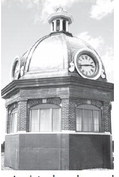Build a culture of security


As the saying goes, a chain is only as strong as its weakest link. Taylor County learned this lesson the hard way last month when a burglar used an employee’s electronic fob an...


As the saying goes, a chain is only as strong as its weakest link. Taylor County learned this lesson the hard way last month when a burglar used an employee’s electronic fob an...